#holy family school nazareth
Text
Holy Family School - A Decline in Enrollment
In recent times at Holy Family School, our Catholic elementary and middle school in Nazareth, Pennsylvania has experienced a significant shift in its dynamics following the appointment of Mr. Derek Peiffer as the new principal. While every change in leadership brings about a period of adjustment, it's evident that Mr. Peiffer's time with us has left a mixed impact on the school community.
One of the most noticeable challenges has been Mr. Peiffer's communication style, which has been less effective than previous principals at Holy Family. Effective communication is crucial in any educational institution, but the staff, parents, and students have found it lacking under his leadership. This lack of transparent communication has led to uncertainty and frustration among parents and teachers alike.
Furthermore, there are concerns about the accountability of students. It seems that Mr. Peiffer's approach towards discipline and accountability has shifted, causing some to feel that students are not being held to the same standards as before. This shift has altered the positive culture that our small school once enjoyed, as a sense of responsibility and discipline were integral to our community.
The consequences of these changes have been felt deeply within our school. Many dedicated teachers have chosen to leave or are considering doing so, which not only affects the quality of education but also erodes the sense of continuity and stability. Morale among both the faculty and parents is notably low, creating a challenging environment for both teaching and learning.
In the face of declining enrollment and the risk of school closure, it's crucial that the concerns of the school community are heard and addressed. Meaningful dialogue, transparent communication, and a shared vision for the school's future are essential components in rebuilding the positive culture that our school once thrived upon. It's our hope that these issues can be addressed and resolved promptly to ensure the continued success and viability of our beloved Catholic school.
#nazarethpa#archdiocese of allentown#lehighvalleypa#catholic schools#holy family school nazareth#save our school#holy family#accountability#nazarethschools#nazarethschooldistrict#blueeagles#northampton county#pennsylvania#private school#catholic school#catholic church#joyful noise#roman catholic#education#teachers#teaching#students#school#learning#classroom#classes#18064#610#educators#teacher
5 notes
·
View notes
Note
can I ask for prayers for me and my loved ones? Thank you

Prayer to the Holy Family
Jesus, Mary and Joseph,
in you we contemplate
the splendour of true love; to you we turn with trust.
Holy Family of Nazareth,
grant that our families too
may be places of communion and prayer, authentic schools of the Gospel
and small domestic churches.
Holy Family of Nazareth,
may families never again experience violence, rejection and division;
may all who have been hurt or scandalized find ready comfort and healing.
Holy Family of Nazareth,
make us once more mindful
of the sacredness and inviolability of the family, and its beauty in God’s plan.
Jesus, Mary and Joseph, Graciously hear our prayer.
Amen.
8 notes
·
View notes
Text
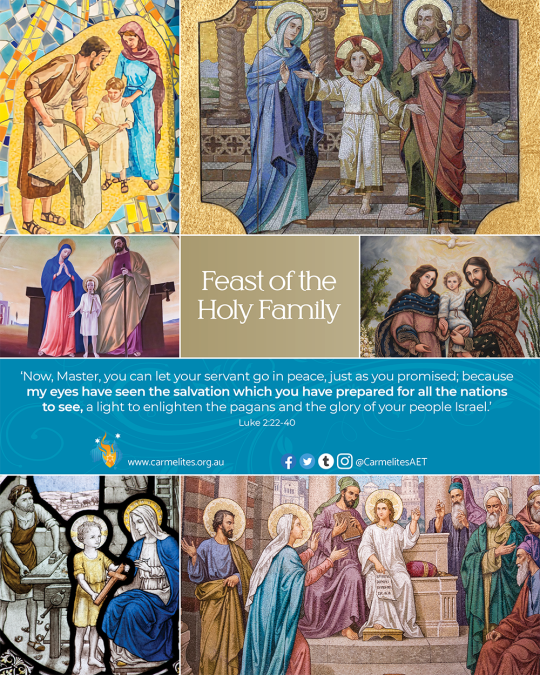
Celebrating the Feast of the Holy Family of Jesus, Mary and Joseph
(31 December)
Pope Francis’ Prayer to the Holy Family
(from Amoris Laetitia)
Jesus, Mary and Joseph,
in you we contemplate
the splendour of true love;
to you we turn with trust.
Holy Family of Nazareth,
grant that our families too
may be places of communion and prayer,
authentic schools of the Gospel
and small domestic churches.
Holy Family of Nazareth,
may families never again experience
violence, rejection and division;
may all who have been hurt or scandalized
find ready comfort and healing.
Holy Family of Nazareth,
make us once more mindful
of the sacredness and inviolability of the family,
and its beauty in God’s plan.
#gospel#scripture#prayer#faith#spirituality#holyfamily#jesus#christ#christmas#motherhood#carmelite#carmelites#catholic#christianity#kingdomofgod#peace#hope#love#courage#holyspirit#family#fatherhood#lightofchrist#redemption#forgiveness#repent#salvation#saviour#godlovesyou
4 notes
·
View notes
Text
Pope Francis’ Prayer to the Holy Family
(from Amoris Laetitia)

Jesus, Mary and Joseph,
in you we contemplate
the splendour of true love;
to you we turn with trust.
Holy Family of Nazareth,
grant that our families too
may be places of communion and prayer,
authentic schools of the Gospel
and small domestic churches.
Holy Family of Nazareth,
may families never again experience
violence, rejection and division;
may all who have been hurt or scandalized
find ready comfort and healing.
Holy Family of Nazareth,
make us once more mindful
of the sacredness and inviolability of the family,
and its beauty in God’s plan.
4 notes
·
View notes
Text
“The family is also a school which enables men and women to grow to the full measure of their humanity. The experience of being loved by their parents helps children to become aware of their dignity as children.
Children need to be brought up in the faith, to be loved and protected. Along with their basic right to be born and to be raised in the faith, children also have the right to a home which takes as its model the home of Nazareth, and to be shielded from all dangers and threats. I am the grandfather of the world, we have heard.”
- Pope Benedict XVI, APOSTOLIC JOURNEY OF HIS HOLINESS BENEDICT XVI TO VALENCIA (SPAIN) ON OCCASION OF THE FIFTH WORLD MEETING OF FAMILIES - VIGIL OF PRAYER, 08 July 2006
5 notes
·
View notes
Text
SAINT OF THE DAY (December 17)
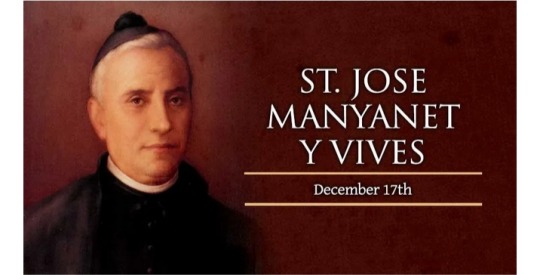
St. Jose Manyanet y Vives was born on 7 January 1883 in Catalonia, Spain.
At the age of five, José’s mother dedicated him to the Virgin Mary and later entered the seminary while still a youth.
He was ordained in 1859 and served as the secretary of the bishop of Urgell, the seminary librarian and the chancery administrator, before responding to the call to found two religious congregations.
He founded the Congregation of the Sons of the Holy Family in 1864 and the Missionary Daughters of the Holy Family of Nazareth 10 years later, both dedicated to the education and protection of the Christian family, as well as education and parish ministry.
He also founded several schools and centers, encouraged devotion to the Holy Family, and wrote many books on issues surrounding the family and spiritual guidance.
Also, in the cultural ambit, he worked for the construction of the Servant of God Antonio Gaudí’s masterpiece, the Temple of the Holy Family, in Barcelona, Spain.
He suffered from physical illnesses all his life, particularly due to two open wounds in his sides for the last 16 years of his life. He died on 17 December 1901 in Spain.
He was beatified on 25 November 1984 and canonized on 16 May 2004 by Pope John Paul II.
NOTE:
"Servant of God" is a title used in the Catholic Church to indicate that an individual is on the first step toward possible canonization as a saint.
#Saint of the Day#St. Jose Manyanet y Vives#Congregation of the Sons of the Holy Family#Missionary Daughters of the Holy Family of Nazareth#Temple of the Holy Family
2 notes
·
View notes
Text
Walking in the Spirit of Love!
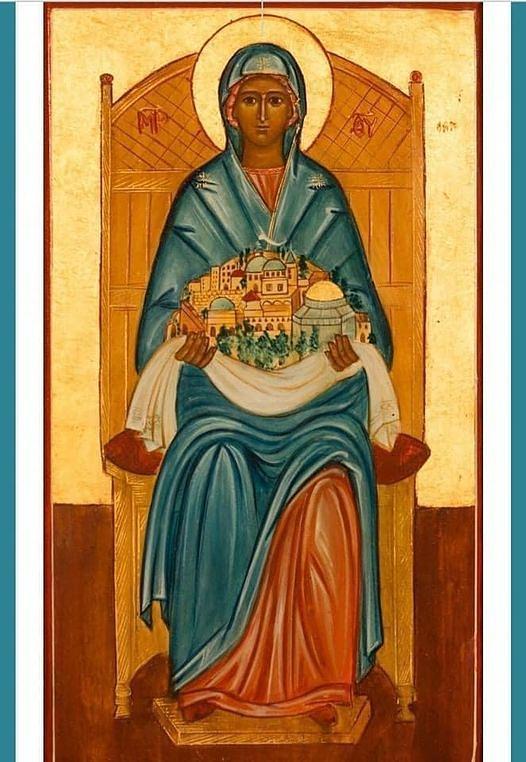
“Mary of Nazareth, who is both Jewish and Palestinian, extend your mantle of mercy over all the peoples of the Holy Land -- Jews, Muslims, Christians, Palestinians, Israelis, migrants, and refugees. Mother of the Messiah, show us how to be instruments of healing and peace in the midst of war, occupation, terrorism, and divisions. Give us an embracing love for all in the Holy Land, especially hostages, innocent victims, the homeless, and the dying. Mary our Mother, given to us by Jesus on the cross, pray for us.” Amen!
Walking in A Spirit of Love!
Key Findings Survey by Trevor Project:
41% of LGBTQ young people seriously considered attempting suicide in the past year—and young people who are transgender, nonbinary, and/or people of color reported higher rates than their peers.
56% of LGBTQ young people who wanted mental health care in the past year were not able to get it.
Transgender and nonbinary young people who reported that all of the people they live with respect their pronouns reported lower rates of attempting suicide.
Fewer than 40% of LGBTQ young people found their home to be LGBTQ-affirming.
Roughly half of transgender and nonbinary young people found their school to be gender-affirming, and those who did reported lower rates of attempting suicide.
=====================================
I think of my own journey in adolescence as a queer youth, for around 10 I realized I was not interested in girls, and knew I was different. As I mentioned that to my parents I was told "You are in a phase," never to mention that to any one, and sermons were preached in church of the sinfulness of being "gay".
I increasingly became depressed in a homophobic society, and experienced all of the chart above; feeling called to ministry; and entering ministry those feelings became worse, until I came out and left my former denomination, and my journey for sanity began.
I remember Jay, a 14 year old kid when I met him hustling on the street; he had come from a small town and came "out" by prostituting , but within himself he was struggling with the issues of his sexuality, and was into drugs, anything to take those feelings away, and at 21 he committed suicide.
The teachings of Jesus are loud and clear all that is required of us is love; it is our own fears, prejudices, and fears of differences that lead to violence and rejection.
The Trevor Project is an organization that works with queer youth, brings them into treatment, has a hot line, which I have worked on, and provides educational information, a worthy project.
As I walk the forty miles, (twenty so far), I remember my own struggles, the fact that I am careful when I go to some parts of the country, and really can not go home again to where I was raised and feel comfortable because of homophobia.
I think of now the hundreds of youth I have walked with in their pain of struggle, depression, and rejection. Many have committed suicide, who have lost families and their home places because of homophobia.
This is why I am walking, this is why I do my work. Join me in the liberation of homophobia and transphobia! Deo Gratis! Thanks be to God!
-------------------------------------------
.
The Trevor Project
PO Box 69232
West Hollywood, CA 90069 US
212-695-8650
===========================
Fr. River Damien Sims, sfw, D.Min., D.S.T.
P.O. Box 642656
San Francisco, CA 94164
www.temenos.org
415-305-2124
=================================
Let Love Ache
Father, give me the courage to keep on loving.
when others keep on hurting.
help me to live an achy love, a gritty,
persistent and emptying love;
a love that’s not afraid to flow toward the other
who has little left to offer in return.
And may I tread faithfully with heaven
through the unfinished work that surrounds me.
Commoners_Communion
Strahan Coleman
0 notes
Text
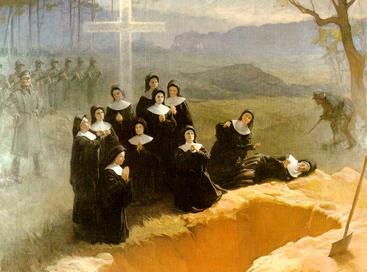
Saint of the day August 01
Bl. Thomas Welbourne, 1605 A.D. English martyr. Born in Hutton Bushel, Yorkshire, he worked as a schoolmaster until his arrest for preaching the Catholic faith. He was arrested and condemned with Blesseds John Fuithering and William Brown. He was hanged, drawn, and quartered at York.
https://en.wikipedia.org/wiki/Thomas_Welbourne
The Blessed Martyrs of Nowogródek, also known as the Eleven Nuns of Nowogródek or Sister Stella and Companions were a group of Roman Catholic nuns from the Sisters of the Holy Family of Nazareth killed by the Gestapo in August 1943 in present-day Belarus.Aug 1
https://en.wikipedia.org/wiki/Martyrs_of_Nowogr%C3%B3dek#:~:text=The%20Martyrs%20of%20Nowogr%C3%B3dek%2C%20also,Gestapo%20in%20August%201943%20in
St. Almedha, sixth century. Virgin and martyr also called Aled or Filuned. The Welsh tradition reports that Almedha was the daughter of King Brychan. Having taken a vow of virginity and dedicated to Christ, Almedha fled from her father's royal residence to escape marriage to the prince of a neighboring kingdom. She went to three Welsh villages - Llandrew, Llanfillo, and Llechfaen - but the people turned her away, despite her promise warning that dreadful thing calamities would befall anyone who denied her sanctuary. Almedha reached Brecon, where she took up residence in a small hut, but the king arrived and demanded her return. When she refused him, he beheaded her. Tradition states that a spring of water appeared on the site of her murder. The three villages that refused her were visited by disasters.
https://en.wikipedia.org/wiki/Saint_Eluned#:~:text=Saint%20Eluned%20(Welsh%3A%20Eiliwedd%3B,Tennyson's%20Gareth%20and%20Lynette.%22.
St. Dominic Van Honh Dieu, Roman Catholic Dominican Priest and Martyr. A native of Vietnam. He was martyred at the age of sixty-seven. Feastday Aug. 1
St. Sofia, Eastern allegory explaining the cult of Divine Wisdom, Faith, Hope, and Charity were the daughters of Wisdom (known as Sofia in the Roman Martyrology on September 30th), a widow in Rome. The daughters suffered martyrdom during Hadrian's persecution of Christians: Faith, twelve, was scourged and went unharmed when boiling pitch was poured on her, was beheaded; Hope, ten, and Charity, nine, were also beheaded after emerging unscathed, from a furnace; and Wisdom died three days later while praying at their graves. Feast day - August 1st.
https://www.st-sophia.com/about/saint
St. Ethelwold. Bishop of Winchester, England, called “the Father of Monks.” Born in that city, he was ordained by St. Alphege the Bald. In 943, he joined the Benedictines at Glastonbury under St. Dunstan. He became the abbot of Abingdon in 955 and bishop in 963. Ethelwold worked with Sts. Dunstan and Oswald of York in bringing about a monastic revival after the Danish invasions. He also expelled the canons of Winchester, replacing them with monks. Ethelwold founded or restored the abbeys of Ely, Chertsey, Milton Abbas, Newminster, Peterborough, and Thorney. He authored Regularis Concordia, a monastic decree based on the Benedictine Rule, and his school of illumination at Winchester was famed.
https://en.wikipedia.org/wiki/%C3%86thelwold_of_Winchester
St. Peregrinus, 643 A.D. Irish or Scottish hermit. Peregrinus was originally a pilgrim who, on his way home from a pilgrimage to Jerusalem and the holy places, chose to become a hermit in the area around Modena, Italy. He remained there for the rest of his life.
https://www.bartleby.com/210/8/015.html
St. Rioch, 480 A.D. Bishop Abbot of lnisboffin, Ireland. He was a nephew of St. Patrick and the brother of Sts. Mel and two others, Melchu and Muinis. They were the sons of Conis and St. Darerca. Rioch was a missionary bishop.
ST PETER FABER, JESUIT,A roommate of Ignatius of Loyola and Francis Xavier from their university days, this gentle guide of souls was a master at giving the Spiritual Exercises. He allowed himself to be spent for the Lord and his Church, helping the Jesuits to become established all over Europe. His feast day is August 1.
St Peter Faber, Jesuit - Information on the Saint of the Day - Vatican News https://www.vaticannews.va/en/saints/08/01/st-peter-faber--jesuit.html
ST. ALPHONSUS MARIA DE’ LIGUORI, ST. ALPHONSUS MARIA DE’ LIGUORI, BISHOP AND DOCTOR OF THE CHURCH, FOUNDER OF THE CONGREGATION OF THE MOST HOLY REDEEMER
https://en.wikipedia.org/wiki/Alphonsus_Liguori
STS. SEVEN BROTHERS MACCABEI
0 notes
Photo

Sun-19-Mar Beyond all question, the mystery of godliness is great: He appeared in a body, was vindicated by the Spirit, was seen by angels, was preached among the nations, was believed on in the world, and was taken up in glory.—1 Timothy 3:16 Thoughts on Today's Verse... Why would Jesus do it? How did he do it? How was he "God with us" and still be God in "human flesh"? We cannot fully comprehend it, but he was! The Son of God was also Jesus of Nazareth, born and placed in a manger at his birth and crucified on a cross at his death. But God raised him from the dead and presented Jesus as his Son with power. Angels on earth saw Jesus after his resurrection and now accompany him in heaven, where he now reigns. He has been preached to people worldwide, many of whom believed in him. One day, Jesus will display his glory for all to see. If you want to understand godliness, then you begin with Jesus! My Prayer... Holy and marvelous God, your plan to redeem and save a sinner like me is incredible. Jesus displayed your longing to see all people come to you and be saved. The love that led you to such sacrifice is beyond my comprehension. Please empower me with your Spirit, the same Spirit who raised Jesus from the dead. I desperately desire for the mystery of your godliness to be seen in my life today, in my family, among my friends, before my co-workers, by those with whom I attend school, and especially in the presence of my enemies. In Jesus' mighty name, I pray. Amen. (at Sunyani) https://www.instagram.com/p/Cp9OKCxoU4O/?igshid=NGJjMDIxMWI=
0 notes
Text
DAILY DEVOTIONAL FOR JANUARY 12, 2023
Trusting God
By Festus Muinde (Nairobi, Kenya)
READ LUKE 1:26-45
"Nothing will be impossible with God."
LUKE 1:37 (NRSV)
"'A brilliant shock of lightning flashed across the pitch-dark sky. A deafening thunderclap followed. I trembled, feeling exposed and vulnerable as the light flashed through the cracks of the grass-thatched mud house where we slept.
I wedged myself into a corner to evade the raindrops of the heavy downpour. I momentarily forgot about my hunger, even though I had eaten only porridge for dinner. Sleeping with an empty stomach was common in our family. I was overwhelmed by a feeling of hopelessness.
“Musee,” my prayerful grandmother mumbled, “don’t worry about our current state; trust God who created you, for nothing is impossible with God. You will own a decent shelter and eat to your fill.” Our devout grandmother Kiima advised us to work hard and to trust in God. She said God would deliver us. “But how? When?” I asked. Nonetheless, I believed her; I trusted God, and I worked hard.
God has been faithful. Despite hardships, I passed my school examinations. I enrolled in a renowned university and graduated with a first-class honors degree. Our family now lives decently, and I am writing a thesis for my master’s degree in communication studies. What a testament to God’s power! Even when life seems hopeless, we can have faith that nothing is impossible with God."' God works miracles in all things. Times may get tough, but the future picture can be amazing and hopeful. Just put your trust in God and follow His guidance. Nothing is impossible with God, Amen!
TODAY'S PRAYER
"O God, help us to believe in your saving power." Amen.
Luke 1:25-45
New International Version
"'25 “The Lord has done this for me,” she said. “In these days he has shown his favor and taken away my disgrace among the people.”
The Birth of Jesus Foretold
26 In the sixth month of Elizabeth’s pregnancy, God sent the angel Gabriel to Nazareth, a town in Galilee, 27 to a virgin pledged to be married to a man named Joseph, a descendant of David. The virgin’s name was Mary. 28 The angel went to her and said, “Greetings, you who are highly favored! The Lord is with you.”
29 Mary was greatly troubled at his words and wondered what kind of greeting this might be. 30 But the angel said to her, “Do not be afraid, Mary; you have found favor with God. 31 You will conceive and give birth to a son, and you are to call him Jesus. 32 He will be great and will be called the Son of the Most High. The Lord God will give him the throne of his father David, 33 and he will reign over Jacob’s descendants forever; his kingdom will never end.”
34 “How will this be,” Mary asked the angel, “since I am a virgin?”
35 The angel answered, “The Holy Spirit will come on you, and the power of the Most High will overshadow you. So the holy one to be born will be called[a] the Son of God. 36 Even Elizabeth your relative is going to have a child in her old age, and she who was said to be unable to conceive is in her sixth month. 37 For no word from God will ever fail.”
38 “I am the Lord’s servant,” Mary answered. “May your word to me be fulfilled.” Then the angel left her.
Mary Visits Elizabeth
39 At that time Mary got ready and hurried to a town in the hill country of Judea, 40 where she entered Zechariah’s home and greeted Elizabeth. 41 When Elizabeth heard Mary’s greeting, the baby leaped in her womb, and Elizabeth was filled with the Holy Spirit. 42 In a loud voice she exclaimed: “Blessed are you among women, and blessed is the child you will bear! 43 But why am I so favored, that the mother of my Lord should come to me? 44 As soon as the sound of your greeting reached my ears, the baby in my womb leaped for joy. 45 Blessed is she who has believed that the Lord would fulfill his promises to her!”' The birth of Jesus was a spectacular and life changing event for people in that time and for all of us today. It has given us the possibility to spend eternity of Jesus in Heaven. Regardless of one's beliefs, this has made it possible for everyone to have the hope of a great after life just because of Jesus. I am blessed! Joe
0 notes
Text
Touring Day 1
After getting some much needed rest, we woke up today to the most beautiful sunrise over the Sea of Galilee, visible from our hotel room! We enjoyed an incredible breakfast of pastries, cheese, salads, and pasta(?!). I’ll be sure to post a food blog at some point, but for now I’m sure you’re more interested in the pictures of everything else.

Our first stop of the day was to Cana of Galilee: the location of the first of the seven signs that Jesus is the Messiah or the first miracle. The story is found in John 2:1-12.

Weddings in Jesus’ day averaged between 700 and 1200 people at them. Everyone was invited: neighbors, immediate family, extended family, anyone with any relation to you; which at that time, could mean everyone. Not only was the guest list large, but the celebration lasted 6 days with the actual wedding happening on the 7th day. The church we visited, The Wedding Church at Cana, sits on top of the ruins for the only first century synagogue in Cana; therefore, this is pretty much where it happened.
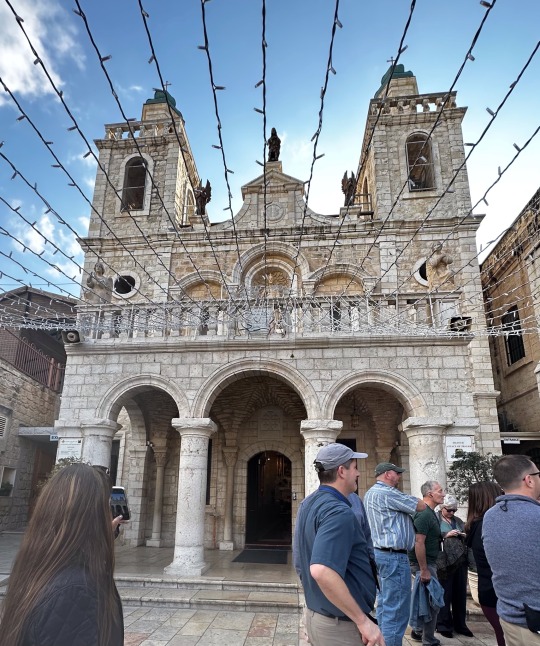
Top: outside of The Wedding Church at Cana
Below: looking down into the ruins of the first century synagogue

John 2:6-7 reads: “Now there were six stone water jars there for the Jewish rites of purification, each holding twenty or thirty gallons. Jesus said to the servants “Fill the jars with water.” And they filled them to the brim.” Pictured below is one of those jars with me for size comparison. They were huge and it was so cool to see it in person.
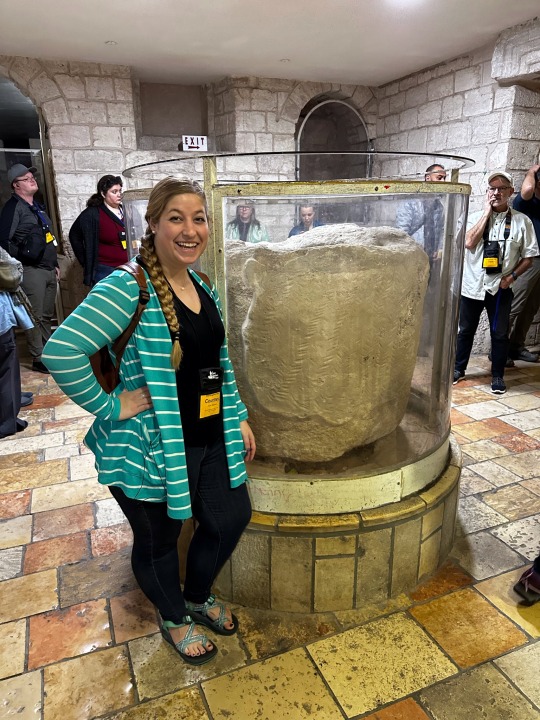
Two funny bonuses from our time at the church: we got to taste “Real Cana Wedding Wine” which is a total tourist trap because there are no wineries in Cana and we got to renew our marriage vows in the chapel (because after two months of marriage we already needed it right? HA no, everyone just told us to jump in the group participating because, well, why not!). Regardless, it was still fun to look Jon in the eyes and promise to love him forever, again.
Our next stop of the day was the the Mar Elias Educational Institution, a school helping to build relationships across barriers in a very divided country. We met with Archbishop Elias Chacour, the founder of the school, who told us about his life and mission with the school. We bought one of his books and had it signed before heading off to lunch.

Pictured above: Jonathan and I getting our book signed (I think this is the first “our” book in the library, guesses on who will read it first?)
After lunch we went to Nazareth to the Basilica of the Annunciation: Mary’s House and the site of the Annunciation. This is my absolute favorite place in all of the Holy Land. I was so excited to go back that I ended up crying on and off the whole time we were there. Surrounding the outside of the Basilica are images of Mary donated by countries from all over the world. Here are a few of my favorites:
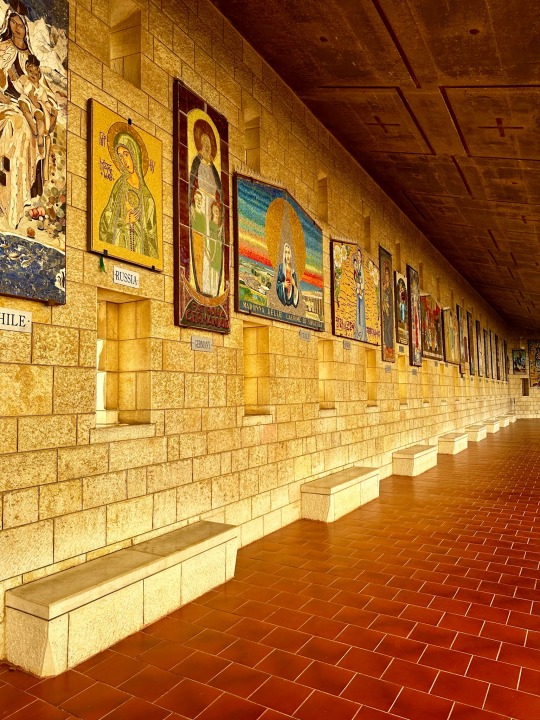
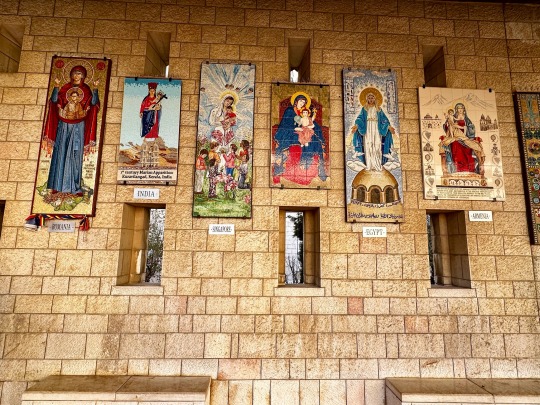
Going inside the Basilica you can see and walk up to Mary’s house. What I love about it so much is how normal it is. Most people in Nazareth lived in caves, nothing fancy, just rocks. They know this specific one is important because there is an inscription on the wall that dates to the first century that says “Hail Mary.”
After the Basilica we went to Mount Precipice which is known as the place where the people of Nazareth tried to throw Jesus off a cliff after teaching in the synagogue (Luke 4:14-29). We watched the sunset and it was absolutely magical.
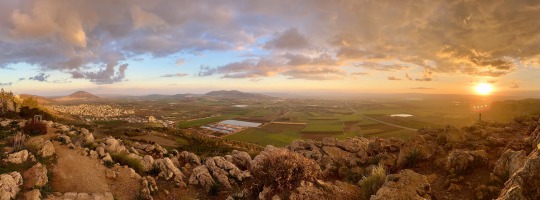
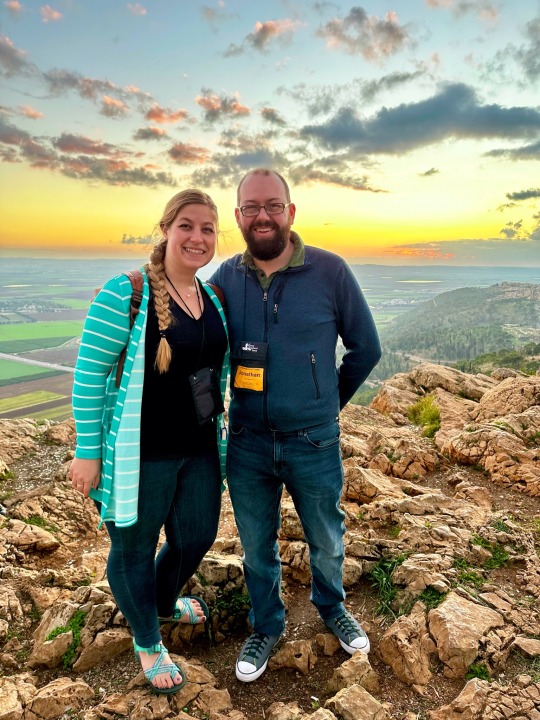
Tomorrow we will spend more time around Galilee and then head over to Bethlehem for Orthodox Christmas Eve!
0 notes
Photo
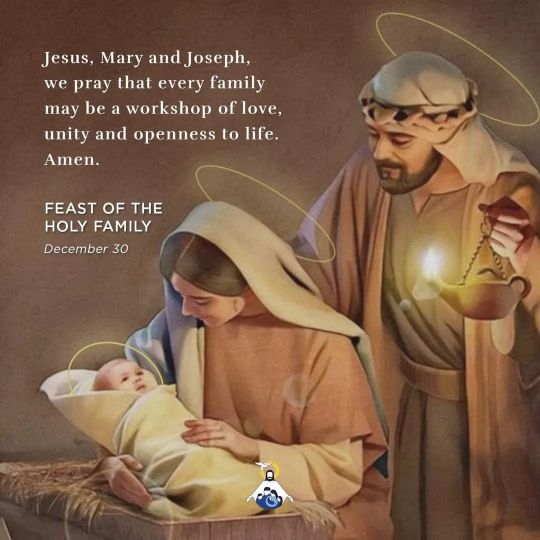
Today, we contemplate the Holy Family of Nazareth. Let us say a prayer for all families as we ponder on the words of St. John Paul II. "For every believer, and especially for Christian families, the humble dwelling place in Nazareth is an authentic school of the Gospel. Here we admire, put into practice, the divine plan to make the family an intimate community of life and love; here we learn that every Christian family is called to be a small “domestic church” that must shine with the Gospel virtues." O Jesus, Mary and Joseph, we entrust our hearts and our lives to you. Amen. #MissinaryFamiliesofChrist #FeastofHolyFamily #BlessedBeyondBounds * * * May God keep your Family in his loving providence and bless you this New Year of 2023 🙏 https://www.instagram.com/p/CmyDRM4oK04/?igshid=NGJjMDIxMWI=
0 notes
Text
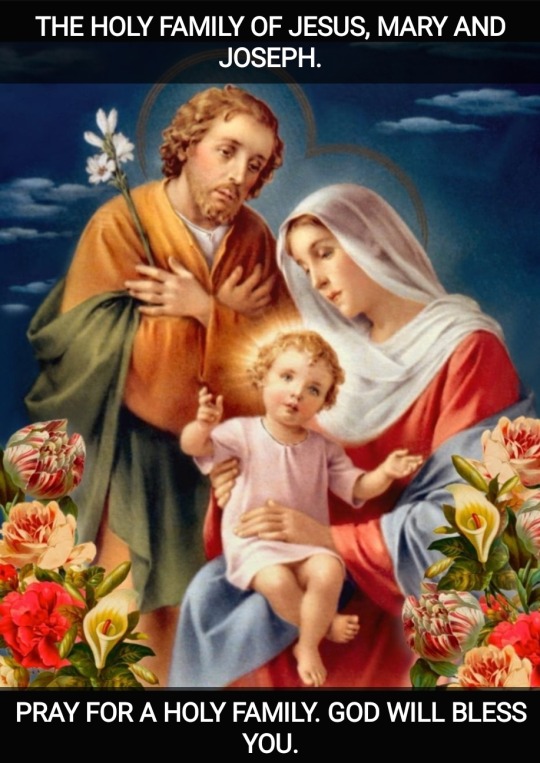
The Holy Family took refuge in Africa. Protect the refugees
"When the magi had departed, behold, the angel of the Lord appeared to Joseph in a dream and said, “Rise, take the child and his mother, flee to Egypt, and stay there until I tell you. Herod is going to search for the child to destroy him.” Joseph rose and took the child and his mother by night and departed for Egypt. He stayed there until the death of Herod, that what the Lord had said through the prophet might be fulfilled, Out of Egypt I called my son.
"When Herod had died, behold, the angel of the Lord appeared in a dream to Joseph in Egypt and said, “Rise, take the child and his mother and go to the land of Israel, for those who sought the child’s life are dead.”
"He rose, took the child and his mother, and went to the land of Israel. But when he heard that Archelaus was ruling over Judea in place of his father Herod, he was afraid to go back there. And because he had been warned in a dream, he departed for the region of Galilee. He went and dwelt in a town called Nazareth, so that what had been spoken through the prophets might be fulfilled, He shall be called a Nazorean." (Matthew 2: 13 - 15, 19 - 23).
Friday 30th December 2022 is the Feast of the Holy Family of Jesus, Mary and Joseph.
Brothers and sisters, why does Holy Mother Church set the Friday of 2022 to celebrate the great feast of the Most Holy Family of Jesus, Mary and Joseph? A few reasons come to mind.
#1. Jesus did not drop from Heaven to earth. He was born into a human family.
#2. The home of Nazareth is the school to learn and understand the life of Jesus.
#3. Our teacher is Mary, the Matriarch of the Holy Family. Mary teaches us three lessons about family life: Silence, Prayer and Work.
#4. The family may be your pathway to holiness: its joys and sorrows are all providentially ordained. Dare not to reject any of it.
Receive this word as a special gift today as you make your way through the last moments of 2022. If the peace of Christ is in your heart and controls your health, job, money, family, food and if the word of Christ dwells in you richly, you will always have a great day, week, month and a grand 2023.
Go for Shalom brothers and sisters:
Peace and Word of God to you always!
Below is a link to an ACT of Consecration to the Holy Family
http://seekfirst.blogspot.com/2022/02/february-dedicated-to-holy-family-of.html?m=1
Daily Bible Verse @ SeekFirstcommunity.com
0 notes
Text
No Room at the Inn
No immigration 'fix' and Congress isn't really trying
Molloy High School organized an amazing toy drive for our Catholic Charities Toy Distribution in Queens. It was an amazing act of giving which will help many of the families we serve.
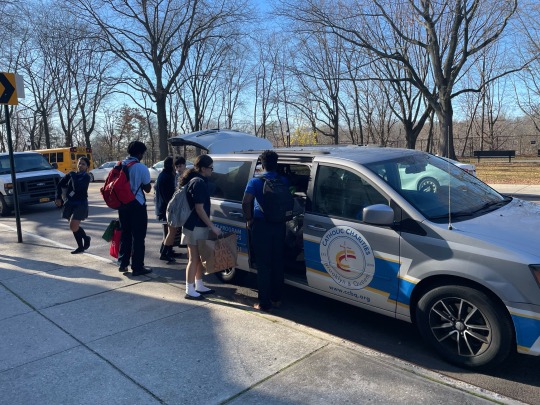
At that event the students had a prayer service before they made their donations. One of the readings from the Gospel of Luke was the famous passage where the Holy Family went to Bethlehem and could not find housing while they were there. I was struck by the famous response from many innkeepers who had to inform Joseph that there is no room at the Inn. As we know, the Holy Family ended staying in a manger, the place where Jesus would be born.
This reading struck me because the fact is that many of us, including us at Catholic Charities, are finding ourselves repeating this unfortunate phrase. With the massive number of asylee and refugees we are finding ourselves saying that there is simply no room in our city. The next day I met with a young man who traveled from Colombia with the promise from a distant relative that he could stay over with them as he gets himself settled. He left the economic instability of his country in order to afford medicine for his mother. He came over with the promise of sponsorship by this distant relative. After he crossed and traveled to NYC the relative informed him that they have no room but that he knew that there were shelters he could stay at. He is now in a shelter trying to find some stability in his life. Later that same day I also met a young Russian family who came to Brooklyn earlier this month and is staying with friends of the family. They have left as political refugees wanting to avoid the war. They are now feeling unwelcomed by their sponsors and came to Catholic Charities wondering what options they have.
The fact is that we are seeing many young families who are struggling to find some form of stability from the chaos of war, civil unrest or absolute poverty. But they are coming in droves to our city and we, quite honestly, are feeling overstretched and beyond capacity to adequately help them.
Normally, when I hear that Gospel reading and hear those words, "there is no room at the Inn," I judge the Innkeeper as a harsh and cold-hearted person. But at this prayer service I actually felt sympathy for the Inn-keeper. I felt that way because I am finding myself saying the same thing. Not because I do not want immigrants here, especially after I hear their tragic stories, but because there is quite literally no room at the Inn. For once, I pictured the inn-keeper feeling sad and guilty. They were not the Roman establishment organizing an oppresive system of taxation nor the Herodian monarchy that would persecute any challenge to their ruling authority. Perhaps the inn-keeper had no choice but to deliver the bad news to this pregnant couple. I have met my own pregnant couples these months who are in SRO's hotel, our own modern day urban manger. They hope for a stable life, but for now, this is where they have to stay. I am sorry to say that I now feel the same sense of guilt that I project on the inn-keeper in this Gospel passage.
The inn-keepers were not responsible for the systemic issues that forced the Holy Family to migrate to Bethlehem. Nor were they responsible for the political persecution that made them refugees in Egypt. Eventually the Holy Family was able to go back to Nazareth and enjoy some sense of stability. But perhaps these oppressive experiences may have helped develop the social message that was part of Jesus' Gospel. Quoting Isaiah Jesus would begin his public ministry by challenging oppressive structures and celebrate the rights and dignities we all have as children of God.
Catholic social teaching teaches us that among our celebrated rights we recognize the right to emigrate. St. John XXIII developed the following teaching back in 1963:
Again, every human being has the right to freedom of movement and of residence within the confines of his own State. When there are just reasons in favor of it, he must be permitted to emigrate to other countries and take up residence there. The fact that he is a citizen of a particular State does not deprive him of membership in the human family, nor of citizenship in that universal society, the common, world-wide fellowship of men. (PT #25)
Pope Francis, however, also reminds us of the right not to emigrate. One may think that this contradicts St. John XXIII's message but that is not the case. Pope Francis instead expands on this right by reminding us of the duty we have, through solidarity, to respond to regional crises so that people are not forced to leave their communities. Many of the people we serve do not want to leave their countries. A couple days after the Molloy HS prayer service I met a Nicaraguan man who, as far as he was concerned, only wants to be here just long enough to financially help the wife and kids he has back home. His hope is to be here 3 to 5 years, no more than that. For that reason he does not want to apply for political asylum even though he could. Pope Francis offered this teaching in his message to migrants in 2015 to address the cause of migration.
The Church stands at the side of all who work to defend each person’s right to live with dignity, first and foremost by exercising the right not to emigrate and to contribute to the development of one’s country of origin. This process should include, from the outset, the need to assist the countries which migrants and refugees leave. This will demonstrate that solidarity, cooperation, international interdependence and the equitable distribution of the earth’s goods are essential for more decisive efforts, especially in areas where migration movements begin, to eliminate those imbalances which lead people, individually or collectively, to abandon their own natural and cultural environment. In any case, it is necessary to avert, if possible at the earliest stages, the flight of refugees and departures as a result of poverty, violence and persecution.
Our charitable organizations are doing all we can to welcome these immigrants but our nation has done nothing to address the systemic issue that has made this situation our current reality. As the article above tells us:
Every president for a generation has tried, and failed, to enact some kind of comprehensive immigration reform. Experts argue that only a holistic approach will work and it needs to address two main problems:
• The millions of undocumented people living in the US
• The antiquated and broken legal immigration system, which does not appropriately acknowledge labor needs of the country and drives people to seek unlawful routes.
Comprehensive immigration reform and Global Development initiatives are the systemic solutions that could help us authentically address the issues that cause the current immigration situation. We are inn-keepers doing what we can for the situations we find ourselves in. But we must hold the global and national political system responsible for the reality of the situation. Our nation needs to respond to our own immigration reality, but we also need to work with the global community to address the issues affecting these nations facing war, conflict and economic depression. Hopefully then, our inn-keepers can respond justly to the local needs that are not over-stressed by international crisis.
In the meantime we will do what we can to bring a little joy to those who are forced to reside in the mangers of our modern urban society.

Bishop Brennan joined us in blessing our toy distribution. Below are his remarks supporting what we do.
vimeo
0 notes
Text
December 16, 2022
Bethlehem Awaits
KAREN WINGATE
Lee en
español
“Wait for the LORD; be strong and take heart and wait for the LORD.” Psalm 27:14 (NIV)
It hurt. My husband’s employers fired him without a word of warning. The next job required selling our beautiful home and moving several states away just as our daughters were entering high school and junior high.
How could God possibly be in this?
Only in hindsight did we realize God’s reasons for the move. Our new location was in a rural setting, which suited our family’s personality much better. Both girls thrived at their new schools, and all of us discovered long, enduring friendships. Then we understood how God had used my husband’s termination to bring us to a place where He had wonderful blessings waiting for us.
I wonder if Mary the mother of Jesus understood that her son had to be born in Bethlehem to fulfill the prophecies about the Messiah. When Joseph told her of the upcoming census that would require them to travel to his hometown, did her eyes light up with comprehension? But of course! The child I bear is the Messiah and He must be born in Bethlehem. And here God is using a Roman census to relocate us from Nazareth to Bethlehem. Isn’t God good?
Or was she clueless? She could have met Joseph’s announcement with this rebuttal:
“Are you serious? Dear heart, I am eight months pregnant. Bethlehem is 80 miles away. I am so NOT riding a donkey OR walking 80 miles in my condition.”
The Bible doesn’t specifically tell us whether Mary connected the dots between her baby’s identity as the Messiah and the location of His prophesied birth. But though Mary didn’t have specific details of the plan, her attitude of calm acceptance and hopeful assurance hints that she knew God was up to something amazing.
Her wide-eyed wonder and hope are expressed in the song of praise she shared with her cousin Elizabeth: “From now on all generations will call me blessed, for the Mighty One has done great things for me—holy is his name” (Luke 1:48b-49, NIV).
Today, as we count down the days until Christmas, we may not always feel like singing about “great things.” The month of December may hold all kinds of snags and detours that can complicate our plans. Have any of these happened to you right before Christmas?
The serious illness of a family member.
A canceled flight to visit family.
A children’s Christmas program gone awry.
Extra household expenses.
Mary’s trek to Bethlehem and my family’s move remind me that God can use what I consider aggravations and heartaches to reposition me so He can bless and use me more effectively.
“Wait for the LORD; be strong and take heart and wait for the LORD,” says Psalm 27:14. The Hebrew word for “wait” is closely related to the word for “hope,” and to hope means to look forward to the future with certainty and eager anticipation. Mary expressed this attitude when, after hearing the angel Gabriel’s message about Jesus, she responded, “I am the Lord’s servant … May your word to me be fulfilled” (Luke 1:38, NIV).
As I approach each Christmas complication this year, I’d like to take on Mary’s attitude. I’d like to look at each change with anticipation spiced with a touch of hope-filled eagerness as I ask, OK, Lord, what do You have waiting for me?
Want to join me? Just think: Bethlehem awaits.
Lord, I invite You to show up in each difficulty I face over the next few weeks. Use these challenges to redirect me into Your glorious plan. Give me ideas of how I can make the most of change to honor and magnify You to those around me. In Jesus’ Name, Amen.
0 notes
Photo
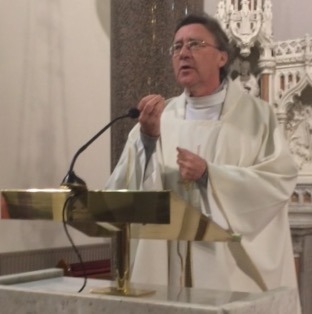
26th December >> Fr. Martin’s Gospel Reflections on Luke 2:41-52 for the Feast of the Holy Family: ‘They did not understand what he meant’.
Feast of the Holy Family
Gospel (Except USA)
Luke 2:41-52
Mary stored up all these things in her heart.
Every year the parents of Jesus used to go to Jerusalem for the feast of the Passover. When he was twelve years old, they went up for the feast as usual. When they were on their way home after the feast, the boy Jesus stayed behind in Jerusalem without his parents knowing it. They assumed he was with the caravan, and it was only after a day’s journey that they went to look for him among their relations and acquaintances. When they failed to find him they went back to Jerusalem looking for him everywhere.
Three days later, they found him in the Temple, sitting among the doctors, listening to them, and asking them questions; and all those who heard him were astounded at his intelligence and his replies. They were overcome when they saw him, and his mother said to him, ‘My child, why have, you done this to us? See how worried your father and I have been, looking for you.’
‘Why were you looking for me?’ he replied. ‘Did you not know that I must be busy with my Father’s affairs?’ But they did not understand what he meant.
He then went down with them and came to Nazareth and lived under their authority.
His mother stored up all these things in her heart. And Jesus increased in wisdom, in stature, and in favour with God and men.
Gospel (USA)
Luke 2:41–52
His parents found Jesus sitting in the midst of the teachers.
Each year Jesus’ parents went to Jerusalem for the feast of Passover, and when he was twelve years old, they went up according to festival custom. After they had completed its days, as they were returning, the boy Jesus remained behind in Jerusalem, but his parents did not know it. Thinking that he was in the caravan, they journeyed for a day and looked for him among their relatives and acquaintances, but not finding him, they returned to Jerusalem to look for him. After three days they found him in the temple, sitting in the midst of the teachers, listening to them and asking them questions, and all who heard him were astounded at his understanding and his answers. When his parents saw him, they were astonished, and his mother said to him, “Son, why have you done this to us? Your father and I have been looking for you with great anxiety.” And he said to them, “Why were you looking for me? Did you not know that I must be in my Father’s house?” But they did not understand what he said to them. He went down with them and came to Nazareth, and was obedient to them; and his mother kept all these things in her heart. And Jesus advanced in wisdom and age and favor before God and man.
Reflections (6)
(i) Feast of the Holy Family
The age of twelve is a significant time in the lives of young people. It often coincides with moving on from primary school to secondary school. It is the time when they celebrate the Sacrament of Confirmation. This is a moment when they make their own ‘yes’ to their baptism which was their parents’ choice for them. Around these years, young people just begin to shape their own identity. As a result, this can be a time of greater tension between the young person and their parents. They are not quite as compliant as they have been, as they forge an identity separate from that of their parents
Jesus in today’s gospel reading is twelve years old. Every year Jesus’ parents had been taking him on the long journey from Nazareth to Jerusalem for the Jewish feast of Passover. This is just one of the ways that his parents were introducing him to the traditions of his Jewish faith. They probably brought him to the local synagogue in Nazareth every Sabbath as well. Jesus’ parents were doing for him what many parents try to do for their children today. As parents, you help your children to pray. You might bring them to the Family Mass on Sunday, even before they make their First Holy Communion. I am often struck by parents bringing their children into the church to pray. There is much for the children to see in our parish church, because the faith is expressed in very visible ways, whether it is the lovely stained glass windows in the Sanctuary or in the side chapel, the striking stations of the cross, the beautiful mosaic of John the Baptist baptizing Jesus in the Reconciliation chapel, the statues and shrines. Images will often communicate more powerfully with children than words. The family is often referred to as the domestic church. The children’s primary experience of church is their family, just as Jesus’ primary experience of his religious tradition was within his family. Yet although the family is the domestic church, that domestic church needs exposure to the wider community of the church that gathers in our parish church. Bringing a child on a visit to the local church, even when there is no public liturgy happening, is one way of opening them up to that larger family of the brothers and sisters of the Lord.
On this occasion, when Mary and Joseph brought Jesus on pilgrimage to the Temple in Jerusalem, he showed a certain independence of spirit. When his parents set out to return home to Nazareth after the feast, Jesus stayed behind. You might wonder why it was only after a day’s journey that Jesus’ parents discovered that he wasn’t with them. There was probably a large family group of relatives and acquaintances who didn’t necessarily travel together, and Jesus could have been with other members of the family. In reality, he was engrossed in a conversation with those considered experts in the Jewish faith. The gospel reading says that ‘he was listening to them, and asking them questions’. He was searching, trying to understand more fully the faith he had absorbed at home. Within Judaism today, at the age of twelve Jewish boys become ‘bar mitzvah’, a son of the law. Jesus was moving from a childhood faith towards an adult faith, listening and asking questions. Many of us will have experienced the probing questions of a young person, about God and God’s relationship with us. We need to keep on creating spaces where children and young people can ask religious questions, where they can give expression to their searching spirit.
There was, of course, something unique about this particular young boy. That is clear from the exchange between himself and his parents when they eventually found him after three days. I saw a wonderful wood carving of this encounter some years ago. Mary had her arms around Jesus, in grateful relief at finding him. Jesus was standing upright, looking into the distance. It captured that sense of Jesus already looking beyond his blood family. When Mary declares that she and his father, Joseph, had been looking for him anxiously, Jesus replied that he needed to be busy with his heavenly Father’s affairs. It is as if, even at this young age, Jesus was aware that his primary loyalty was to God, his heavenly Father, and to the work that God was entrusting to him. Less than twenty years later, Jesus would begin to form a new family, the family of those who seek to do the will of God the Father as he, Jesus, reveals it. This is the family of faith to which we all belong. There is a sense in which, because we belong to this wider family of faith, we can all say with Jesus, ‘I must be busy with my Father’s affairs’.
In response to this statement of Jesus, it is said of his parents in today’s gospel that ‘they did not understand what he meant’, and it is said of Mary, in particular, that ‘she stored up all these things in her heart’. Like parents of every age, they struggled to understand what was going on in their child and they had to learn to let him go to a purpose greater than their own. Not just parents but all of us are asked to journey with others in ways that create space for God’s good purpose for their lives to come to pass.
And/Or
(ii) Feast of the Holy Family
One of the most distressing experiences for parents must be when their children get temporarily separated from them. It can happen easily enough in places like busy shopping centres, especially when the child has got to an age when he or she likes to ramble off. When the child is eventually found, firm words are often spoken by the parent. That kind of tension-filled experience is part of normal family life.
In the gospel reading this morning, Luke describes a similar kind of experience in the family of Joseph, Mary and Jesus. Jesus’ parents expected him to travel with the extended family, and even at first presumed he was doing so when they did not see him. However, the 12 year old had a different set of expectations for himself. Luke suggests that even at the relatively young age of 12, Jesus was more concerned with the expectations of his heavenly Father than with his parents’ expectations. As a result, the one who came to seek out and to find the lost, was himself considered lost by his parents, and was sought for until he was found. In reality, Jesus was not lost. He was where he was supposed to be, and it was his parents who ended up somewhat lost as they tried to come to terms with his words to them, ‘Did you not know that I must be busy with my Father’s affairs?’
The experience of loosing and searching is one that most families struggle with over time. The child who rambles off in the busy shopping centre is only one expression of that experience. The older teenager, the young adult, can head off in a direction that parents find hard to understand; they can take a path in life other than what parents might have wanted. As a result, parents can struggle with a sense of loss, as their hopes and expectations for their son or daughter don’t appear to materialize.
The tensions of family life, and the arguments that such tensions often lead to, can also result in family members moving away from each other, separating from each other, not only in a geographical sense but sometimes in an emotional sense as well. Even in the absence of any major row, the differences in temperament between family members can sometimes leave them feeling strangers to each other, sensing that they have never really found each other in any meaningful sense. It can be quite late in life before there is any true meeting of minds and hearts.
One of the challenges of family life is dealing with difference, trying to come to terms with the different paths that different family members take in life. When a family member takes a path that is unexpected, and that causes others some pain, it can be tempting to ask them the question that Mary asked Jesus, ‘Why have you done this to us?’ It is an understandable question, one that comes out of love and that reveals the pain of love. Yet, it is a question that can also reveal a failure to see a bigger picture, one that is more complex than our particular expectations of the person allow for.
There was something much bigger going on in the life of their young son Jesus than Mary and Joseph realized. There was a mystery to her son that Mary would not fully fathom until Pentecost. There is a sense in which that is true of all of us. There is often more going on in the life of a family member who seems very different from us that we could ever understand. From our perspective they can seem lost. Yet, in reality, they may be struggling to be true to something very deep in themselves, something that is of God. Our primary task may not be to find them and to put them right, but to recognize and to honour whatever is of value in the path they are taking.
Although Mary did not understand the path her son took at the age of 12, the gospel reading says that ‘she stored up all these things in her heart’. She ruminated on all that had happened. It was only over time that she came to understand more fully. That is often the way in our own families. What a son or a daughter or a parent says or does can leave us very perplexed, and even deeply hurt. It is only over time that we can begin to see what was really going on in all that was said and done. Deeper understanding often only comes after much reflection, as a result of the storing up of memories and, perhaps, the sharing of those memories with others, or the bringing of them to prayer. Our deeper understanding can then lead us to make a more compassionate response to the family member in question. Even though we may think we know members of our family very well, it is often the case that we have a very limited insight into what is really going on in their lives. That realization should prompt us to suspend judgement.
Mary and Joseph were faithful to their son Jesus, even though they did not understand him. We are called to be faithful to each other as family members, even when we remain something of an enigma to each other. The second reading speaks of the love the Father has lavished on us by letting us be called God’s children. We are not only sons and daughters of our parents. More fundamentally, we are sons and daughters of God who is always faithful to us in his love. We are called to reveal something of that faithful and lavish love of God for his children in the ways we relate to each other within our families.
And/Or
(iii) Feast of the Holy Family
We all make special efforts to connect with our family members at this time of the year. Those who live abroad try to get home for Christmas. We go out of our way to visit family members in their homes at this Christmas time, and family members visit us in our homes. Many of us move on from our families of origin when we get to a certain age, but our families of origin remain important to us, and it is above all at Christmas that we recognize that. We may not see eye to eye with our brothers and sisters and even our parents about everything, but they will always matter to us, and they seem to mean more to us at this time of the year than at any other time. Our relationship with family members remains strong, even if those relationships change over the years, as we individually grow and change.
Jesus did not appear on the scene fully grown. He was born an infant and he spent the first thirty years of his life with his family in his home in Nazareth. He grew up in a family setting with all its joys and pleasures, its pains and problems. He learned from his family the same things that all children learn from their families. He learnt his faith, his religion, from his mother and father who were very devout Jews. According to this morning’s gospel reading, his parents used to go to Jerusalem every year for the feast of Passover, taking their son with them. From a very early age Jesus was introduced to the religious heritage and traditions of his people; he was formed in the faith. Like other Jewish boys of devout parents, he was opened up to the Jewish Scriptures, the stories of God’s dealings with his people. He learned to pray the psalms, which generations of Jews before him had prayed. If his parents brought Jesus the long distance from Nazareth to Jerusalem once a year on the feast of Passover, they almost certainly brought him the much shorter distance to the local synagogue in Nazareth, at least once a week on the Sabbath. His parents passed on their faith to him. Yet, this morning’s gospel reading suggests that Jesus did not simply accept without question everything he was told by his parents. As soon as he came of age, he began to question things. In this morning’s gospel reading we find him in the temple sitting among the doctors of the Jewish Law listening to them and asking them questions. Jesus would emerge into adulthood with a great appreciation of his Jewish religious heritage, but he would also reinterpret that heritage in ways that would disturb many people, especially the religious experts of the day.
This morning’s gospel suggests that Jesus’ independent approach to his religious heritage and tradition left his parents somewhat disturbed as well. I know that many parents today can be very disturbed when their own sons and daughters don’t go on to practice the faith in the way that they as parents have always done. Many parents feel helpless in the face of this; nothing they say or do seems to make any difference. Parents can begin to blame themselves for what they perceive as their failure to pass on the faith to their children. This can be a source of great sadness for many parents. Yet, when children get to a certain age it is natural for them to question everything and to critique what they once accepted without question. This independence of spirit seems to show itself in the area of religious belief and practice more than in any other area of life. We have come to appreciate more fully in recent years that faith, as well as being a gift from the Lord, is also a choice. We have to say our own ‘yes’ to those fundamental religious values that our parents said ‘yes’ to on our behalf when we were baptized. Saying our own ‘yes’ to what is most fundamental in life can take time. It can involve a long and sometimes tortuous journey, a journey that cannot be plotted by others, even by loved ones. The Lord respects our freedom; he never ceases to call us, but he waits for us to respond to his call, and he allows us to respond in the way that is most personal to each of us.
I find the exchange between the twelve year old Jesus and his mother in this evening’s gospel reading very thought provoking. Jesus’ parents had brought him to Jerusalem on pilgrimage, but Jesus did not return with them. Instead, he went his own way. This independence of spirit was quite distressing to his parents. ‘Son, why have you done this to us?’ his mother asked him. Jesus’ reply did not reassure them; it simply left them more confused, ‘Did you not know that I must be busy with my Father’s affairs?’ Perhaps for the first time Jesus’ parents began to realize that they could not chart their son’s religious journey. God was at work in Jesus’ life in a way they, as parents, did not understand and they had to let him go. God is always at work in all of our lives, even in the lives of those who take a different religious path to the one we expected them to take, and wanted them to take.
And/Or
(iv) Feast of the Holy Family
Christmas is very much a family feast. Family members return from all over the world to be together. We try to connect with members of our families at this time. Because Christmas is such a family occasion, it can be a difficult time for those who do not have family, for one reason or another, those who live alone because family members have died or are living abroad. The blood family is not the only unit to which we belong. Through baptism we belong to a wider family, the family of faith, the family of the church. That wider family of the faith can be very important to those who have little in the way of blood family members. Early in his ministry Jesus set about the formation of a new family, the family of his disciples, whom he called his brothers and sisters. In this morning’s second reading, Saint John declares that we are already the children of God, the sons and daughters of God, sharing in Jesus’ own relationship with God, as his brothers and sisters.
Important as our blood family is to all of us, we need that wider family of faith as well. Our parish community is the local expression of that wider family of faith, and our parish church is where that local family of faith gathers for worship. We gather together as family in our parish church, as brothers and sisters in Christ, sons and daughters of God. The parish church is the house of God where we are all welcome as the family of the Lord’s disciples. The blood family has much to receive from this wider family of faith. It has much to give to that wider family as well; the parish community needs the gifts and energy of the members of the families that make up the parish. Ideally we need the gifts, energy and experience of every age group, if our parish life is to be rich and full. The richer and fuller the life of our parish is, the more the parish family, can be a support to the individual families within the parish.
Jesus was born into a family, as most of us were. His family would have been very conscious that they were members of a wider family of faith, the family of the Jewish people. This family of faith met weekly in the local synagogue to hear the word of God proclaimed. They went up to Jerusalem for the great feasts that were celebrated in the Temple there. In this morning’s gospel reading we are told that every year the parents of Jesus used to go to Jerusalem for the feast of the Passover. Jesus’ parents were careful to initiate him into the traditions of this wider family. They had him circumcised on the eight day; they brought him to the local synagogue in Nazareth every Sabbath, and occasionally brought him to Jerusalem for the great feasts. Parents today make efforts to initiate their children into the traditions of the wider family of faith to which they belong, starting with bringing them to the church for baptism. Many parents bring their children to the family Mass here on a Sunday, and encourage them to get involved in the programmes for First Communion and Confirmation.
Yet, as parents know better than I do, when it comes to that wider family of of the church, children do not always take the path that parents might like them to take. They often stand up to their parents in relation to belonging to this wider family, especially when they get to a certain age. We find something similar happening in today’s gospel reading’ Jesus stands up to his parents. They had certain expectations of him. When the feast of Passover was over they expected that he would return immediately with them to Nazareth. However, Jesus, even at the age of twelve, seemed to be walking to a different drum beat to that of his parents. He stayed on in Jerusalem after his parents had left, asking questions of the doctors of the law and listening to them. He is portrayed as a young adolescent, full of questions, and those questions would eventually set him on a path that his parents struggled to accept and understand. When Jesus’ parents eventually found him, his own questions to them left them perplexed; ‘they did not understand what he meant’. His questions were, ‘Why are you looking for me? Did you not know that I must be busy with my Father’s affairs?’ There was a mystery to Jesus that his parents struggled to come to terms with. There is a sense in which that is true of every family member. Parents often find their children something of a mystery; although flesh of their flesh, they are profoundly other. Children will often experience their parents in the same way. The presence of mystery can be disturbing but it often indicates the presence of the Lord. It has been said that being family is an intimate involvement with the divine and that family living is a sacred process. The portrait of Jesus in today’s gospel reading suggests that those family members who are full of questions and who seem to travel to a different drum beat may be closer to the Lord than we might think.
And/Or
(v) Feast of the Holy Family
The Sunday after Christmas is a very good time to be celebrating the feast of the holy family. Christmas is very much a family time. Most of us try to make some effort to connect with our family members at Christmas time. There is something about Christmas which brings us together as family. That is also true of the wider family of believers we call the church. There are certainly more people than usual at Mass on Christmas day. There is something about the feast of Christmas that brings together the members of the family of faith. Moving out further beyond the church family to the human family, Christmas is a time when we become more aware of the members of the wider human family, especially those who are in greatest need. There is no doubt that Christmas draws great generosity from people. Charities are the beneficiaries of such generosity at this time of the year. Our own very large collection for the St Vincent de Paul society on the third Sunday of Advent bears witness to that.
Perhaps one of the reasons why we have such a stronger sense of family at Christmas time, of our personal family, of the Christian family and of the human family, is because at the heart of the feast of Christmas is a family. Jesus was born into a family, a family that consisted not just of Mary and Joseph but of many other relatives as well, grandparents, aunts, uncles and cousins. This morning’s gospel reading makes reference to Jesus’ ‘relations and acquaintances’. The way of referring to Jesus’ family as the ‘holy family’ can have the effect of making this family seem rather remote from us. Yet, Jesus’ family was a human family, like any other family of the time in many ways. The gospels suggest that the people of Nazareth, Jesus’ hometown, did not see his family as all that different from their own families. When Jesus went back to Nazareth as an adult to preach his gospel, the people of his town asked, ‘Where did this man get all this?... Is not this the carpenter, the son of Mary and the brother of James and Joses and Judas and Simon, and are not his sisters here with us?’ They were really saying, ‘He is just like us, so how come he seems to have all this wisdom and is capable of performing all these mighty deeds?’ As a baby, as a child, as a teenager, as a young adult in Nazareth, Jesus did not seem to have stood out in as all that different to others of his age. In a small town like Nazareth at that time, everyone struggled to survive, and Jesus and his family would have been no different. His father Joseph had a skill which he passed on to his son and which they both used to try and make ends meet.
The story about Jesus’ family we have just heard in the gospel reading describes an experience which is not all that far removed from the experience of families today. Jesus was twelve years of age. In the Jewish culture of the time that was the age when children began to take on the responsibilities of adulthood. The gospel reading suggests that Jesus began to show an independence of spirit at the age of twelve. As devout Jews, his parents had brought him to Jerusalem for the great feast of Passover. They returned from Jerusalem with their extended family, relatives and acquaintances, presuming that Jesus was somewhere among this wider family network. Not a bit of it! He had stayed behind in the Temple. He was fascinated by the teachers of God’s Law that he found there. The gospel reading says he was listening to them and asking them questions. His questions emerged out of his listening. If Jesus was fascinated by these learned men, they were astounded at his intelligence and his replies. Jesus, it seems, was lost in a world that his parents did not inhabit to the same degree. When his parents finally found him, the exchange between them highlights the extent which Jesus and his parents were on different wavelengths. Addressing Jesus, Mary refers to ‘your father and I’, meaning Joseph and herself. In reply, Jesus refers to ‘my Father’, meaning God. Even at this young age it seems that Jesus knew himself to be subject to a higher authority than his parents.
The gospel reading says that his parents did not understand what he meant, but, nonetheless, Mary stored up what Jesus had said in her heart. She didn’t dismiss what he said but mulled it over in her mind and heart. Perhaps there are lessons here for us all today in our dealings with each other, whether it is blood family members or those who belong to the wider families of the church or of humanity. We don’t easily understand one another; we remain strangers to one another. There was clearly a mysterious quality to Jesus, which his parents would have been most aware of, but there is a mysterious quality to each one of us. Just as God was clearly at work in Jesus’ life from an early age, God is at work in all of our lives. Sometimes all we can do is respect the mystery of each other, and, like Mary, learn to ponder that mystery which we will never fully grasp.
And/Or
(vi) Feast of the Holy Family
Christmas is very much a family time. Most of us will have made contact with our families over the Christmas. If we cannot meet up in person, we will phone, or email or text or send a card. We instinctively feel that Christmas is a time to connect with our family. Today we celebrate the feast of one particular family. We traditionally think of it as a family of three, Jesus, Mary and Joseph. Yet, these three would have thought of their family in a much wider sense. The extended family was very important in Jesus’ time and culture. There were aunts and uncles, grandparents, cousins, nephews and nieces in Jesus’ family. Many of us will have happy memories of our extended family. I was fortunate to have had two wonderful aunts who never married, and who lived here in Clontarf, on Oulton Road. When I was a child, they used to come to our house to stay with myself and my brothers for a few hours while my parents went to the pictures. They were like a second and third mother to us in ways. I am sure many people here would acknowledge the hugely significant influence of members of the extended family on their own upbringing, be it grandparents, aunts, uncles, cousins.
Much as we value our families, we all know from experience that tensions within families are inevitable. The family whose feast we celebrate today had its own tensions, as is evident from today’s gospel reading. This is the only story we have in the gospels of the child Jesus acting on his own. Jesus was twelve years of age; in the Jewish tradition this was considered to be the age when the child began to live as an adult. He would probably also have begun his apprenticeship in Joseph’s workshop at that age. The gospel reading suggests that at this significant age, Jesus was beginning to assert his own identity, staying behind in Jerusalem while the rest of his family began the journey home. Like many a twelve year old, he wanders off on his own, oblivious to the worry he gives his parents. As children mature in response to the love of their parents, they begin to forge their own path, as Jesus is portrayed as doing in the gospel reading. This can create tensions in the family and distress for parents. Something of Mary’s distress is evident in her words to Jesus when she and Joseph finally found him after much anxious searching, ‘Child, why have you treated us like this? Your father and I have been searching for you in great anxiety’. There is a tone of rebuke there, but it is clearly coming from a loving heart. Jesus’ response to Mary, ‘Did you not know that I must be busy with my Father’s affairs?’, only increased her and Joseph’s bafflement at their young son’s behaviour. ‘They did not understand what he meant’. Mary spoke to Jesus of ‘your father’, meaning Joseph. Jesus replied by speaking of ‘my Father’, meaning God.
Luke, the evangelist, is suggesting that, even at this early age, Jesus’ relationship with God was the most important relationship in his life. The young Jesus judged that being busy with his heavenly Father’s affairs meant staying behind in the Temple, listening to the doctors of the Law, and asking them questions, Jesus was being faithful to his searching, enquiring spirit, even if that meant causing distress and worry to his parents. Jesus was finding his identity by affirming his relationship with God as the primary relationship in his life. It was a painful struggle for Mary and Joseph to allow their young son to grow into his God-centred identity. Yet, the ending of the gospel reading says that Jesus subsequently went back with his parents to Nazareth where he remained under their authority, and where, within their loving embrace he grew in wisdom, stature and favour with God and others. There was no fundamental conflict between his relationship with God and his relationship with his parents. Indeed, it was the faith of his parents which helped Jesus to recognize the primary call of God in his life.
Because Jesus’ deepest longing was to do God his Father’s will, as an adult, he set about forming a new family. He would go on to declare that those who seek to do the will of God the Father, as he does, are his brothers and sisters and mother. This is the family of his disciples, the family of those who hear and do the word of God as proclaimed by Jesus. We all have a desire to belong in this family, the church, which is why we are here at this Mass. Within this family of faith, we look to Jesus as our brother and to God his Father as our Father. This is the primary family to which we belong and it is a great gift from God. In the words of today’s second reading, ‘think of the love that the Father has lavished on us by letting us be called God’s children’. We spend our lives trying to live out of this graced identity, as sons and daughters of God, brothers and sisters of Jesus, and temples of his Spirit. If we are trying to be true to this faith family identity, then we will be sources of blessing within our own blood families.
Fr. Martin Hogan.
2 notes
·
View notes